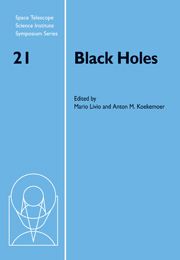Book contents
- Frontmatter
- Contents
- Participants
- Preface
- Black holes, entropy, and information
- Gravitational waves from black-hole mergers
- Out-of-this-world physics: Black holes at future colliders
- Black holes in globular clusters
- Evolution of massive black holes
- Supermassive black holes in deep multiwavelength surveys
- Black-hole masses from reverberation mapping
- Black-hole masses from gas dynamics
- Evolution of supermassive black holes
- Black-hole masses of distant quasars
- The accretion history of supermassive black holes
- Strong field gravity and spin of black holes from broad iron lines
- Birth of massive black-hole binaries
- Dynamics around supermassive black holes
- Black-hole formation and growth: Simulations in general relativity
- Estimating the spins of stellar-mass black holes
- Stellar relaxation processes near the Galactic massive black hole
- Tidal disruptions of stars by supermassive black holes
- Where to look for radiatively inefficient accrection flows in low-luminosity AGN
- Making black holes visible: Accretion, radiation, and jets
Black holes in globular clusters
Published online by Cambridge University Press: 11 April 2011
- Frontmatter
- Contents
- Participants
- Preface
- Black holes, entropy, and information
- Gravitational waves from black-hole mergers
- Out-of-this-world physics: Black holes at future colliders
- Black holes in globular clusters
- Evolution of massive black holes
- Supermassive black holes in deep multiwavelength surveys
- Black-hole masses from reverberation mapping
- Black-hole masses from gas dynamics
- Evolution of supermassive black holes
- Black-hole masses of distant quasars
- The accretion history of supermassive black holes
- Strong field gravity and spin of black holes from broad iron lines
- Birth of massive black-hole binaries
- Dynamics around supermassive black holes
- Black-hole formation and growth: Simulations in general relativity
- Estimating the spins of stellar-mass black holes
- Stellar relaxation processes near the Galactic massive black hole
- Tidal disruptions of stars by supermassive black holes
- Where to look for radiatively inefficient accrection flows in low-luminosity AGN
- Making black holes visible: Accretion, radiation, and jets
Summary
Dynamical evolution in star clusters naturally creates an environment in which interactions among massive stars, binaries, and compact remnants are common. Young clusters may temporarily contain a significant population of stellar black holes, and close encounters and physical collisions among stars in dense cluster cores may lead to the formation of very massive stars and high-mass black holes via runaway merging. Numerical simulations suggest runaway masses in the range commonly cited for intermediate-mass black holes. While our understanding of black hole formation and retention has improved greatly in recent years, substantial uncertainties remain in both the physics of the runaway merger process and the evolution of very massive stars. Direct and indirect observational evidence have been reported for massive black holes in globular clusters, although here too interpretations remain controversial. I examine critically some details of the processes possibly leading to massive black holes in present-day globular clusters, and discuss some observational constraints on the various theoretical scenarios.
Introduction
Black holes are natural products of stellar evolution in massive stars, and may also result from dynamical interactions in dense stellar systems, such as star clusters and galactic nuclei. They can significantly influence the dynamics of their parent cluster, and may also have important observational consequences, via their x-ray emission, the production of gravitational radiation, and their effect on the structural properties of the system in which they reside.
Globular clusters offer particularly rich environments for the production of black holes in statistically significant numbers. Direct evidence for black holes in globulars is scarce, although several independent lines of investigation now hint at their presence.
- Type
- Chapter
- Information
- Black Holes , pp. 46 - 61Publisher: Cambridge University PressPrint publication year: 2011



